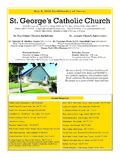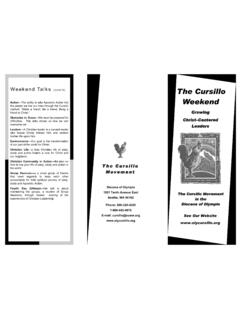Transcription of The 800 Pound Gorilla in the Room - Written by …
1 ~ 1 ~ Th e 800 Pound Gorilla in the RoomBy; Charles Bissett (August 2010) Proverbs 28: 13 14 (NIV): 13He who conceals his sins does not prosper, but whoever confesses and renounces them finds mercy. 14 Blessed is the man who always fears the LORD, but he who hardens his heart falls into trouble. How did we get to the point where we find ourselves caught within a raging debate going on in the greater Church? It is because a major denomination, the ELCA (Evangelical Lutheran Church in America), has elected to embrace a modernistic metaphorical belief system called antinomianism undergirded by an Emergent Church panentheismi belief system. It is a belief system that is sweeping through too many of the evangelical denominations, and even the Catholic Church.
2 SThis is an issue that is greater than the singular question of ordaining active homosexual . The acceptance of two heretical belief systems being allowed into the ELCA directly conflict with the Apostles Creed, the Nicene Creed and the Athanasian Creed. This has caused changes in ELCA church law to coincide with these new belief systems. The first is antinomianism, and the second is the Emergent Church belief system. These changes have been criticized or renounced by every other major Lutheran denomination in the world. If you go on the internet, the volume of Christian commentators (aside from WordAlone and CORE) criticizing the ELCA for what has done is overwhelming. Almost 91,000 members and 48 congregations have left the ELCA after the enactment of its new doctrinal policies so far and hundreds more will iii Roman Catholic theological pundits in the blogosphere are having a field day chastising Lutherans for being shameless in their infidelity to the Scriptures.
3 Even the atheists are questioning the integrity of their claim to being called, followers of Christ. Here, one shares a quote from a contemporary atheist philosopher who is a pundit blogger on the internet. Professor Austin Cline, in his article: Problems in Liberal Theology wrote: One of the interesting conundrums facing liberal Christian theology is that so little of it seems to really be Christian .. More and more of the historical, orthodox doctrines are abandoned in favor of metaphorical beliefs that are compatible with modernity. Where does such a process ultimately lead? Is there a point where the belief system ceases to be Christianity in any meaningful sense, or does Christianity simply become so broad that it encompasses a huge variety of incompatible systems?
4 Iv Again; this is an issue that is greater than the singular question of ordaining active homosexuals. Our atheist friend s comments go to the heart of the ELCA s Bound Conscience policy; where incompatible belief systems are asked to co exist with each other. The issue confronting us as followers of Christ (more significant than membership within the ELCA) is about the authority of the Scriptures, as being the Word of God. This is about a pattern of events that has been going on for the past fifteen, plus years. This is about a transformation that reflects new belief systems taking over the denomination, and threatening other denominations. ~ 2 ~ Let me take a moment to introduce myself: I am a convert to Christianity from a secular and politically liberal family.
5 I was introduced to Christianity through the Charismatic Revival (the Jesus People subsection) of the early 1970 s. I served for three years as an Army Chaplain s assistant. In the late 1980 s, I determined to serve out my faith through the Lutheran church, and joined the ELCA for its non fundamentalist evangelicalism. Likewise, I have been a lifelong civil rights activist. My friends refer to me as a California liberal. So, I can appreciate the attraction people have to the Gospel of Social Justice, which is unseating so many of our classical Christian beliefs. Christian Belief and Core Values: What defines the nature of true church or denomination s teachings that are common to all Christians? For the Christians who are focused on believing the Word of God as it is Written directly from Bible, alone, the Roman Road to Salvation is the most commonly referenced concise description of the Christian belief system.
6 (There are a large number of sites on the internet that one can Google to find the Roman Road to Salvation.) For Christians who also interpret the Bible against church tradition, there are a series of documents or creeds which authenticate what constitutes the minimum values of a true Christian belief system. The oldest document that defines Christian belief is the Didache, which claims to have been authored by the twelve apostles. While this is unlikely, the work appears to be a direct result of the first Apostolic Council, (Acts 15:28). This is followed by the Apostles Creed, which was drawn up in the first or second century. It emphasizes the true Humanity of Christ, including the material body, of Jesus, since that is the point that the heretics of the time (Gnostics, Marcionites, and later Manicheans) denied.
7 (1 John 4:1 3) The Nicene Creed, drawn up in the fourth century, is emphatic in affirming the Deity of Christ. It is directed against the Arians, who denied that Christ was fully God. (Colossians 2:9) The importance of Christ s divinity is well expressed in Barnes Notes on the Bible as he elaborates on Colossians 2:9. For in him dwelleth That is, this was the great and central doctrine that was to be maintained about Christ, that all the fullness of the Godhead dwelt in him. Every system which denied this was a denial of the doctrine which they had been taught; and against everything that would go to undermine this; they were especially to be on their guard. Almost all heresy has been begun by some form of the denial of the great central truth of the incarnation of the Son of One of the most influential and least known creeds is the Athanasian Creed; also known as the Quicumque vult , in which the word Trinity is first used.
8 The use of the word, Trinity defines a uniquely Christian belief. It was not used by the apostles in scripture, but this word serves as a convenient shorthand for pulling together the scriptures mentioned in this section, into a singular thought that attempts to describe God: .. And the Catholic Faith is this: That we worship one God in Trinity, and Trinity in Unity; Neither confounding the Persons; nor dividing the Essence. For there is one Person of the Father; another of the Son; and another of the Holy Ghost. But the Godhead of the Father, of the Son, and of the Holy Ghost, is all one; the Glory equal, the Majesty coeternal. Such as the Father is; such is the Son; and such is the Holy Ghost. The Father uncreated; the Son uncreated; and the Holy Ghost uncreated.
9 The Father unlimited; the Son unlimited; and the Holy Ghost unlimited. The Father eternal; the Son eternal; and the Holy Ghost eternal. And yet they are not three eternals; but one eternal. As also there are not three uncreated; nor three infinites, but one uncreated; and one infinite. So likewise the Father is Almighty; the Son Almighty; and the Holy Ghost Almighty. And yet they are not three Almighties; but one Almighty. So the Father is God; the Son is God; and the Holy Ghost is God. And yet they are not three Gods; but one ~ 3 ~ Thus, the classical Christian beliefs and core values of those who are traditional, conservative, or orthodox in their faith will fall into the baseline scriptures and creeds mentioned above, in this section. However, such belief system statements are not enough to answer all theological questions about cosmology or about mans relationship with the eternal.
10 Thus these subtle differences, which are beyond the baseline tenants, become the issues that constitute the branches or denominations of Christianity. Over 90% of all professing Christians (indifferent to the laity s understandings of Scripture) are affiliated with a Christian body (church) that officially professes these baseline tenants. Almost all these churches have incorporated the Nicene Creed into their worship services. Anything that does not conform to the above baseline might like to call itself Christian, but is not. The First Prong, Me Focus: The movement away from traditional Nicene Creed Christianity is a part of a growing heresy within Christian denominations called, Emergent Church. The advocates of the Emergent Church movement do not have a creed or a singular doctrinal system of belief.



